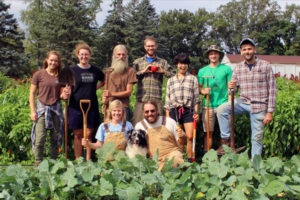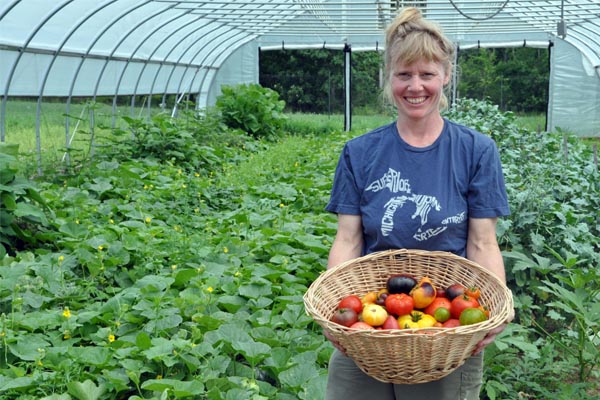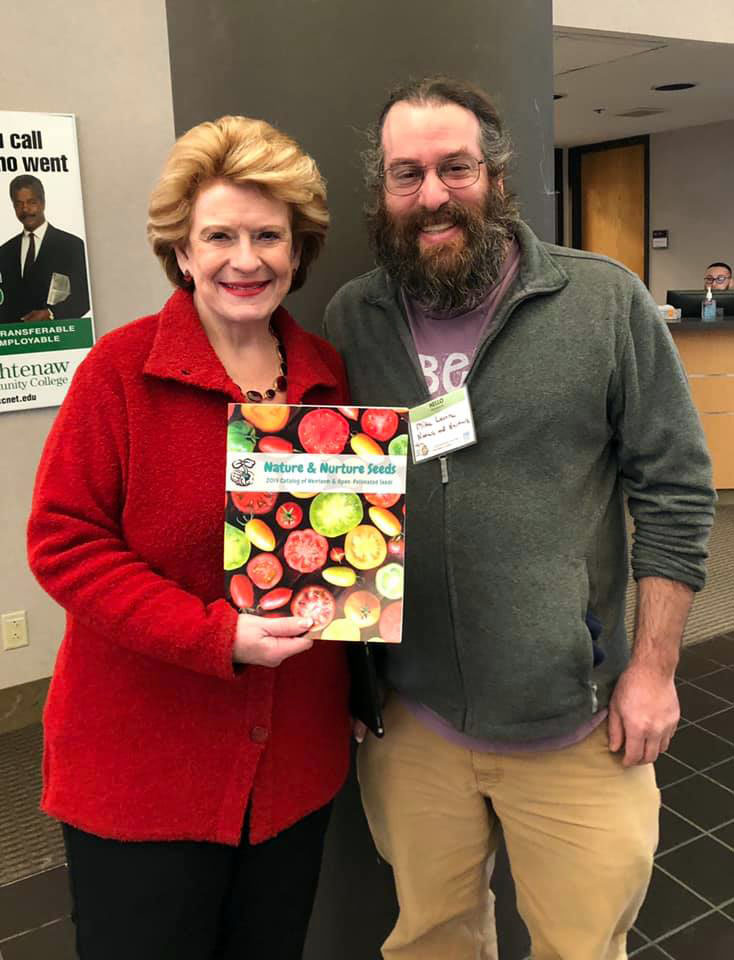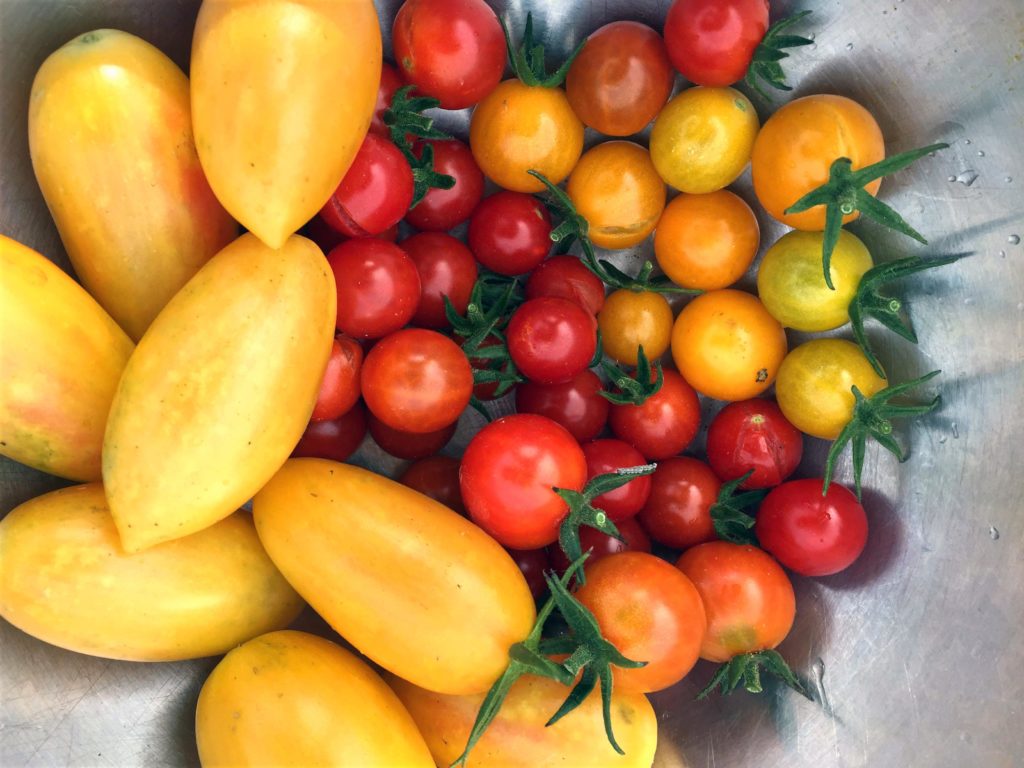
Winters in the Upper Midwest are bitterly cold, and the short summer days are heavy with humidity and scorching heat. The big swings in seasons challenges diversified vegetable farmers in the area to get creative with their varieties, and that means regional adaptability. That’s why seed growers Erica Kempter and Mike Levine work to adapt and breed open-pollinated seeds for farmers and gardeners in the Upper Midwest.
Erica and Mike are farmers, seed growers, and plant breeders, and own Nature & Nurture Seeds. Their 80-acre certified organic farm is located near Ann Arbor, Michigan, and their dedication to regionally adapted seeds shines through in their seed offerings and organizing work. The duo is helping to build a network of regional seed growers and in doing so bringing back seed production to the Upper Midwest. Because of their focus on seeds that can be adapted to the region, they are incredibly passionate about open-source seeds and keeping it in the hands of farmers and gardeners.
Erica and Mike grow three acres of seeds each year and their company Nature & Nurture Seeds serves home gardeners and diversified organic farmers. They grow over a dozen seed crops – tomatoes, peppers, tomatillo, ground cherry, brassicas (mustards, collards, kale, arugula), cucumbers, melons, okra, radish, beets, amaranth, flowers, paw paw, a variety of greens, and annual and perennial herbs. They also conduct extensive variety trials, working on varieties that are vigorous, productive, tasty, and have good marketability as produce crops. Today all of their seed is harvested and cleaned by hand, but Erica and Mike just bought an Allis-Chalmers All-Crop Harvester and have plans to scale-up some of their production.
Growing greens in the cold winters of the Upper Midwest requires farmers to cover their crops in hoophouses. After wrestling covers over their greens one too many times, Erica and Mike decided on a better idea – breeding varieties that can handle the chill. Today on their farm they’re breeding and selecting lettuce, arugula, kale, mache, mustards, and spinach for cold hardiness. Their eye is on varieties that can grow uncovered in hoophouses down to -5°F.

Erica self-proclaims being “gaga about tomatoes” and so it’s no surprise that they also have several tomato breeding projects going at the farm. She is working with several breeding lines of saladette and grape tomatoes that are productive and taste great. Their main breeding goals include regional adaptation, disease resistance, flavor, and market appeal. Stay tuned for new introductions to their catalogue offerings.
Erica and Mike also grow and offer two of their favorite regional heirloom tomatoes – ‘Early Detroit’ and ‘Wisconsin 55’ tomatoes. According to Erica, they “rescued ‘Early Detroit’ from languishing in the USDA seedbank.” And it’s a good thing for our taste buds that they did, because the medium slicer has sublime flavor. ‘Wisconsin 55’ came out of the University of Wisconsin-Madison in the 1940’s and was bred to be a uniform, crack resistant, medium slicer with good disease resistance and flavor, making it a dependable farm variety.
There’s a lot of excitement and energy for regional seed in the Upper Midwest and Erica and Mike are helping to build a network of seed growers in the area. They encourage beginning seed growers to start with crops they love and do well in their climate – experience and experimenting will take it from there. Nature & Nurture Seeds is excited to be scaling up their own production and in the future plan to work with regional producers who want to grow seeds on contract for them.
Erica and Mike are also advocates for policies and research that support small seed growers. Erica thinks it’s important for seed growers to engage with their elected officials. She finds that most representatives “know nothing about the importance of seeds and germplasm,” making it incredibly important that they “see our faces and hear our concerns so that we can hold them accountable to us — after all they are supposed to work for us!”

Last winter Mike made it a priority to meet one of his senators. He participated in a local food summit in Washtenaw County where Senator Stabenow (D-MI) spoke. Knowing she is the ranking democrat on the Senate Agriculture, Nutrition, and Forestry Committee, he pushed to the front of the crowd to hand her their seed catalog and ask about public funding for organic plant breeding.
“She was receptive and gave me the email of her assistant, and asked me to follow up with her,” Mike says.
The issue of public funding for organic breeding is incredibly important to Mike and Erica. Even though Michigan State University is only an hour from their farm, Mike and Erica say “there’s no one there that can help us.” Mike adds, “To find an academic who can help us with our goals, we either have to reach out to Madison or Cornell.”
At the end of the day, Mike pushed through that crowd to let Senator Stabenow know that the organic farming community in Michigan needs more funding for public plant breeding.
You can find Nature & Nurture Seeds online, and around Ann Arbor at farmers markets, events, and festivals, and a few seed racks at local garden shops.
Are you growing seed in the Upper Midwest region?
Organic Seed Alliance is hosting the Upper Midwest Seed Summit in October to bring together regional seed leaders to learn, connect, and identify opportunities to advance organic seed in the region. Learn more about the gathering here.
Photo credits: Nature & Nurture Seeds


